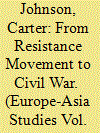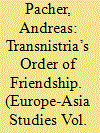| Srl | Item |
| 1 |
ID:
174385


|
|
|
|
|
| Summary/Abstract |
The development of Russian civil society is linked to authoritarian government, fear of ‘colour revolutions’ and the ‘sovereign democracy’ that legitimises state control of civil society. This article acknowledges the narrowing room for manoeuvre of contemporary Russian civil society and discusses NGOs’ practices in the context of government pressures, the politicisation of transnational connections and the increasing geopolitical tension surrounding Russia. It describes the localisation and depoliticisation of Russian NGOs as well as their disruptive practices, and explains how narrowing civil society identities inform the self-governing of NGOs. Finally, it argues that seeing Russian civil society in simple dichotomies further narrows these identities.
|
|
|
|
|
|
|
|
|
|
|
|
|
|
|
|
| 2 |
ID:
174390


|
|
|
|
|
| Summary/Abstract |
This article compares resistance movements along the western borderlands of the Soviet Union between 1944 and 1952. Despite similar levels of state repression and local grievances, Moldova’s opposition movement did not escalate to the level of civil war, whereas civil wars emerged across the Baltic states, Belarus, and Ukraine. Through theory development and testing, the article compares Lithuania and Moldova, identifying the role of previous regime behaviour, the speed of Soviet takeover, and the availability of safe havens within Moldova and Lithuania as the key causal factors explaining the difference.
|
|
|
|
|
|
|
|
|
|
|
|
|
|
|
|
| 3 |
ID:
174388


|
|
|
|
|
| Summary/Abstract |
In this article, we look at the fissures in United Europe from both sides of the region where a post-Cold War ‘Middle/Central Europe’ should have been forged. How do leading German and Polish newspapers treat the categories of ‘Central’ or ‘Middle’ Europe relative to the concept of the Eastern–Western European divide and what are the discourses associated with these perspectives? At the time of a looming redefinition of the entire European project, what can media reports from Germany and Poland tell us about its future? We conclude that the media narratives in these two countries portend further tensions for European unity, since the new divisions now overlap the old ones. Our findings have implications for the future of democracy in the newly democratic countries of Central and Eastern Europe, including Poland.
|
|
|
|
|
|
|
|
|
|
|
|
|
|
|
|
| 4 |
ID:
174386


|
|
|
|
|
| Summary/Abstract |
Effective systems of vocational education are crucial to economic and social development. However, the coordination of labour market demand and the supply of skill requires either well-functioning labour market institutions or institutionally embedded strategic partnerships among government, labour and employers. In particular, the transplantation of German-style dual education methods to a different environment poses significant institutional dilemmas. Russia presents a useful case for examining the conditions under which such arrangements can be established. Based on a series of interviews in six Russian regions and a set of case histories, we seek to draw testable hypotheses that can be applied to other settings.
|
|
|
|
|
|
|
|
|
|
|
|
|
|
|
|
| 5 |
ID:
174387


|
|
|
|
|
| Summary/Abstract |
After the collapse of the Soviet Union, Kazakhstan was faced with domestic conditions that made cooperation with Russia rational. Kazakhstan inherited a large ethnic Russian population and a severe economic depression. These conditions affected other countries emerging from the Soviet Union, but only Belarus matched Kazakhstan’s level of strategic cooperation with Russia. President Nursultan Nazarbaev’s dominance of Kazakhstan’s national security agenda offers a partial explanation for the cooperation, but we still need to ask what makes him different from the leaders of other post-Soviet countries that faced the same conditions. Kazakhstan’s pattern of historical development provides the key to understanding the cooperation. The timing of the country’s contact and experiences with the Russian-led empires led to a ‘dominant ally’ image of Russia that continues to decide the two countries’ relationship to the present day.
|
|
|
|
|
|
|
|
|
|
|
|
|
|
|
|
| 6 |
ID:
174389


|
|
|
|
|
| Summary/Abstract |
What strategies do de facto states employ in conducting their diplomacy? This article examines Transnistria’s Order of Friendship, a state award that primarily targets foreigners, by analysing the profiles of all known award recipients. The Order is found to be a political tool to enhance Transnistria’s domestic and external legitimacy in the absence of recognised sovereignty. The findings confirm the literature on Transnistria’s ‘bandwagoning’ with Russia, indicate that a patron’s support must be actively sought rather than taken for granted, and—since many awardees are from jurisdictions other than the patron state Russia—point to the need to examine the foreign policy of de facto states more holistically.
|
|
|
|
|
|
|
|
|
|
|
|
|
|
|
|